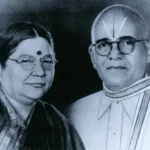Annie Besant: A Revolutionary Leader and Social Reformer (Top 10 Facts About Her Remarkable Contributions)
Annie Besant, a name that reverberates in the history of India’s freedom struggle and social reforms, was a visionary leader who made profound contributions to both British and Indian society. Born in 1847 in London, Besant’s journey from a passionate social reformer to an influential figure in the Indian independence movement exemplifies her indomitable spirit, courage, and unwavering commitment to the cause of human rights, education, and national self-determination.
Early Life and Background
Annie Besant was born on October 1, 1847, in London, England, into a middle-class family. Raised in a household that valued intellectualism, she had access to an education that was somewhat rare for women during that time. Besant’s early life was marked by personal struggles, including the death of her parents and a troubled marriage. Despite these challenges, Besant was an ardent reader, a keen learner, and a passionate thinker.
Her initial interest in social issues and politics began with her involvement in the Unitarian Church, which gave her the opportunity to study and debate various philosophical and political ideas. She later became a member of the Fabian Society and was involved in social reforms in the UK, particularly in improving conditions for women and workers.
The Transition to India and the Indian Independence Movement
Annie Besant’s journey to India in 1893 marked a turning point in her life. At the time, India was under British colonial rule, and the Indian independence movement was beginning to take shape. Besant was deeply moved by the plight of the Indian people and saw the country’s potential for self-rule. Her fascination with Indian culture, philosophy, and spirituality led her to join the Theosophical Society, a religious and philosophical organization that sought to promote universal brotherhood, the study of ancient wisdom, and the exploration of spiritual knowledge.
During her time in India, Besant became an outspoken advocate for Indian independence. She worked tirelessly to promote national unity and independence, aligning herself with prominent Indian leaders such as Bal Gangadhar Tilak and Lala Lajpat Rai. Besant’s deep belief in the power of education, women’s rights, and self-reliance resonated with the Indian populace, and she quickly became a beloved figure in India’s freedom struggle.
Daily Life and Work Habits
Annie Besant’s daily life was driven by her commitment to social reform, education, and spirituality. Her schedule was intense and centered around her work in both the Theosophical Society and the Indian independence movement. She would spend her days meeting with political leaders, giving lectures, writing articles, and engaging in community outreach.
Besant’s work habits were marked by discipline and determination. She was known for her tireless efforts, often working long hours without rest. She maintained a strict routine, dedicating time to both personal reflection and public service. Despite the immense pressure she faced as a public figure, Besant’s humility, devotion, and resolve made her a source of inspiration to those around her.
Her ability to communicate and connect with diverse audiences made her a powerful orator and writer. She frequently traveled across India, delivering speeches on subjects ranging from self-rule to women’s rights, and was particularly invested in promoting the educational empowerment of women. Besant also played a crucial role in establishing schools, including the Central Hindu College in Varanasi, which later became part of the Banaras Hindu University.
Impact on Society and India
Annie Besant’s impact on India was immense. Through her work in the Theosophical Society, she introduced many Indians to Western ideas and philosophies, while also deepening their understanding of their own cultural and spiritual heritage. She believed that India’s strength lay in its ancient traditions, but it also needed to embrace modernity and education to advance.
Besant’s dedication to the cause of Indian self-rule brought her into the fold of the Indian independence movement. She advocated for self-rule and national independence long before it became a mainstream idea in the political discourse. Besant also played a significant role in promoting the rights of women, pushing for reforms in education and society that would empower women and provide them with the tools to succeed in a rapidly changing world.
Her work as a leader and educator set the stage for future generations of leaders, particularly women, to take up the cause of national independence and social reform. Her establishment of the Home Rule League was instrumental in galvanizing the masses and promoting the idea of self-rule within the Indian political framework.
Frequently Asked Questions (FAQs)
1. Who was Annie Besant?
Annie Besant was a British social reformer, Theosophist, and a key figure in the Indian independence movement. She worked tirelessly to promote Indian self-rule, women’s rights, and educational reforms.
2. What were Annie Besant’s contributions to India?
Besant contributed to India’s independence movement by advocating for self-rule and women’s rights. She played an instrumental role in the founding of the Home Rule League and was an advocate for educational reforms in India, particularly in empowering women through education.
3. How did Annie Besant impact women’s rights?
Besant was a vocal proponent of women’s rights, particularly in the areas of education and social equality. She established schools and organizations that empowered women and provided them with the opportunity to gain an education.
4. What is the legacy of Annie Besant?
Annie Besant’s legacy is one of leadership, social reform, and unwavering dedication to justice and equality. Her work in both the Theosophical Society and the Indian independence movement left an indelible mark on India’s history, and she remains an inspirational figure for many.
Key Facts About Annie Besant
- Founder of the Home Rule League: Besant founded the Home Rule League in 1916, advocating for Indian self-rule and challenging British colonial policies.
- Theosophical Society Leader: Besant became the president of the Theosophical Society, promoting spiritual awareness and bringing Western philosophical thought to India.
- Women’s Rights Advocate: Annie Besant campaigned for women’s education and rights, founding schools and organizations that empowered women.
- Political Leader: She was a prominent leader in the Indian independence movement, aligning herself with other national leaders like Bal Gangadhar Tilak and Lala Lajpat Rai.
- Author and Orator: Besant was known for her powerful speeches and writings on various subjects, from spiritual philosophy to political independence.
Significance and Observance
Annie Besant’s significance lies not only in her political and social reforms but also in her ability to transcend boundaries and unite people from diverse backgrounds. As a leader, she made an indelible mark on the history of India’s struggle for independence. Her work as an educator and social reformer helped shape India’s future, laying the foundation for a generation of leaders who would fight for freedom.
Her life continues to be celebrated in India, where she is remembered as one of the key figures in the struggle for independence and social change. Her contributions to the fields of education, women’s rights, and Indian nationalism are still revered today.
Conclusion
Annie Besant’s life is a testament to the power of determination, vision, and courage. As a leader in both the social reform and independence movements, she remains an icon whose contributions shaped the future of India. Her legacy of education, equality, and self-rule continues to inspire people across the globe, and she is remembered as a figure who dedicated her life to the betterment of humanity.










